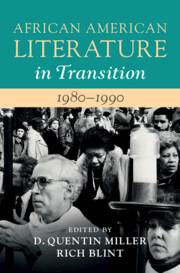Book contents
- African American Literature in Transition, 1980–1990
- African American Literature in Transition
- African American Literature in Transition, 1980–1990
- Copyright page
- Contents
- Notes on Contributors
- Preface
- Introduction
- Part I The Expanding Canon
- Part II New Directions/New Literary Forms
- 6 The Trey Ellis 1980s and the Discovery of an Artistic School
- 7 Hip-Hop in Transition
- 8 Reframing and Reappropriating Blackness in 1980s Satire
- Part III Global Connections
- Index
8 - Reframing and Reappropriating Blackness in 1980s Satire
from Part II - New Directions/New Literary Forms
Published online by Cambridge University Press: 02 February 2023
- African American Literature in Transition, 1980–1990
- African American Literature in Transition
- African American Literature in Transition, 1980–1990
- Copyright page
- Contents
- Notes on Contributors
- Preface
- Introduction
- Part I The Expanding Canon
- Part II New Directions/New Literary Forms
- 6 The Trey Ellis 1980s and the Discovery of an Artistic School
- 7 Hip-Hop in Transition
- 8 Reframing and Reappropriating Blackness in 1980s Satire
- Part III Global Connections
- Index
Summary
The reframing of Black stereotypes in view of new terms of respectability in the 1980s demonstrated the ease with which assumptions of Black abjection could be reproduced and mocked to challenge their preeminence. This chapter examines the “Black Stereotype Sketch” on Saturday Night Live, George C. Wolfe’s play The Colored Museum, and Sherley Anne Williams’s novel Dessa Rose to demonstrate how 1980s satirists scrutinized stereotypes surrounding Blacknessin an effort to subvert them. Through the embodiment of the limiting stereotypes of Black identity, these satirists reveal the ridiculousness of mainstream presumptions of Black abjection and open up a space for an autonomous declaration of nuanced Black identity. By raising inherent questions of authorship, these satirists push back against the naturalization of Black abjection that is intrinsic to Americanness. The subversive nature of satire in the 1980s comes through the acknowledgment of the calculated nature of Black stereotypes. Satire not only reveals the unsustainability of race and racialization as theory, but also wages a greater critique against a broader social realm that remained so devoted to racialization in practice.
- Type
- Chapter
- Information
- African American Literature in Transition, 1980–1990 , pp. 160 - 182Publisher: Cambridge University PressPrint publication year: 2023

